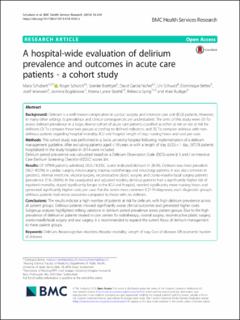Please use this identifier to cite or link to this item:
https://doi.org/10.21256/zhaw-3879| Publication type: | Article in scientific journal |
| Type of review: | Peer review (publication) |
| Title: | A hospital-wide evaluation of delirium prevalence and outcomes in acute care patients : a cohort study |
| Authors: | Schubert, Maria Schürch, Roger Boettger, Soenke Garcia Nuñez, David Schwarz, Urs Bettex, Dominique Jenewein, Josef Bogdanovic, Jasmina Staehli, Marina Lynne Spirig, Rebecca Rudiger, Alain |
| DOI: | 10.21256/zhaw-3879 10.1186/s12913-018-3345-x |
| Published in: | BMC Health Services Research |
| Volume(Issue): | 18 |
| Page(s): | 550 |
| Pages to: | 562 |
| Issue Date: | Jul-2018 |
| Publisher / Ed. Institution: | BioMed Central |
| ISSN: | 1472-6963 |
| Language: | English |
| Subjects: | Cost of diseases OR economic burden of diseases; Delirium; Hospital mortality; Length of stay; Neurocognitive disorder |
| Subject (DDC): | 362.1041: Health economics 362.11: Hospitals and related institutions 616.8: Neurology, diseases of nervous system |
| Abstract: | Background: Delirium is a well-known complication in cardiac surgery and intensive care unit (ICU) patients. However, in many other settings its prevalence and clinical consequences are understudied. The aims of this study were: (1) To assess delirium prevalence in a large, diverse cohort of acute care patients classified as either at risk or not at risk for delirium; (2) To compare these two groups according to defined indicators; and (3) To compare delirious with non-delirious patients regarding hospital mortality, ICU and hospital length of stay, nursing hours and cost per case. Methods: This cohort study was performed in a Swiss university hospital following implementation of a delirium management guideline. After excluding patients aged < 18 years or with a length of stay (LOS) < 1 day, 29′278 patients hospitalized in the study hospital in 2014 were included. Delirium period prevalence was calculated based on a Delirium Observation Scale (DOS) score ≥ 3 and / or Intensive Care Delirium Screening Checklist (ICDSC) scores ≥4. Results: Of 10′906 patients admitted, DOS / ICDSC scores indicated delirium in 28.4%. Delirium was most prevalent (36.2–40.5%) in cardiac surgery, neurosurgery, trauma, radiotherapy and neurology patients. It was also common in geriatrics, internal medicine, visceral surgery, reconstructive plastic surgery and cranio-maxillo-facial surgery patients (prevalence 21.6–28.6%). In the unadjusted and adjusted models, delirious patients had a significantly higher risk of inpatient mortality, stayed significantly longer in the ICU and hospital, needed significantly more nursing hours and generated significantly higher costs per case. For the seven most common ICD-10 diagnoses, each diagnostic group’s delirious patients had worse outcomes compared to those with no delirium. Conclusions: The results indicate a high number of patients at risk for delirium, with high delirium prevalence across all patient groups. Delirious patients showed significantly worse clinical outcomes and generated higher costs. Subgroup analyses highlighted striking variations in delirium period-prevalence across patient groups. Due to the high prevalence of delirium in patients treated in care centers for radiotherapy, visceral surgery, reconstructive plastic surgery, cranio-maxillofacial surgery and oral surgery, it is recommended to expand the current focus of delirium management to these patient groups. |
| URI: | https://digitalcollection.zhaw.ch/handle/11475/8240 |
| Fulltext version: | Published version |
| License (according to publishing contract): | CC BY 4.0: Attribution 4.0 International |
| Departement: | School of Health Sciences |
| Organisational Unit: | Institute of Nursing (IPF) |
| Appears in collections: | Publikationen Gesundheit |
Files in This Item:
| File | Description | Size | Format | |
|---|---|---|---|---|
| publ-812-Schubert.pdf | 1.08 MB | Adobe PDF |  View/Open |
Show full item record
Schubert, M., Schürch, R., Boettger, S., Garcia Nuñez, D., Schwarz, U., Bettex, D., Jenewein, J., Bogdanovic, J., Staehli, M. L., Spirig, R., & Rudiger, A. (2018). A hospital-wide evaluation of delirium prevalence and outcomes in acute care patients : a cohort study. BMC Health Services Research, 18, 550–562. https://doi.org/10.21256/zhaw-3879
Schubert, M. et al. (2018) ‘A hospital-wide evaluation of delirium prevalence and outcomes in acute care patients : a cohort study’, BMC Health Services Research, 18, pp. 550–562. Available at: https://doi.org/10.21256/zhaw-3879.
M. Schubert et al., “A hospital-wide evaluation of delirium prevalence and outcomes in acute care patients : a cohort study,” BMC Health Services Research, vol. 18, pp. 550–562, Jul. 2018, doi: 10.21256/zhaw-3879.
SCHUBERT, Maria, Roger SCHÜRCH, Soenke BOETTGER, David GARCIA NUÑEZ, Urs SCHWARZ, Dominique BETTEX, Josef JENEWEIN, Jasmina BOGDANOVIC, Marina Lynne STAEHLI, Rebecca SPIRIG und Alain RUDIGER, 2018. A hospital-wide evaluation of delirium prevalence and outcomes in acute care patients : a cohort study. BMC Health Services Research. Juli 2018. Bd. 18, S. 550–562. DOI 10.21256/zhaw-3879
Schubert, Maria, Roger Schürch, Soenke Boettger, David Garcia Nuñez, Urs Schwarz, Dominique Bettex, Josef Jenewein, et al. 2018. “A Hospital-Wide Evaluation of Delirium Prevalence and Outcomes in Acute Care Patients : A Cohort Study.” BMC Health Services Research 18 (July): 550–62. https://doi.org/10.21256/zhaw-3879.
Schubert, Maria, et al. “A Hospital-Wide Evaluation of Delirium Prevalence and Outcomes in Acute Care Patients : A Cohort Study.” BMC Health Services Research, vol. 18, July 2018, pp. 550–62, https://doi.org/10.21256/zhaw-3879.
Items in DSpace are protected by copyright, with all rights reserved, unless otherwise indicated.